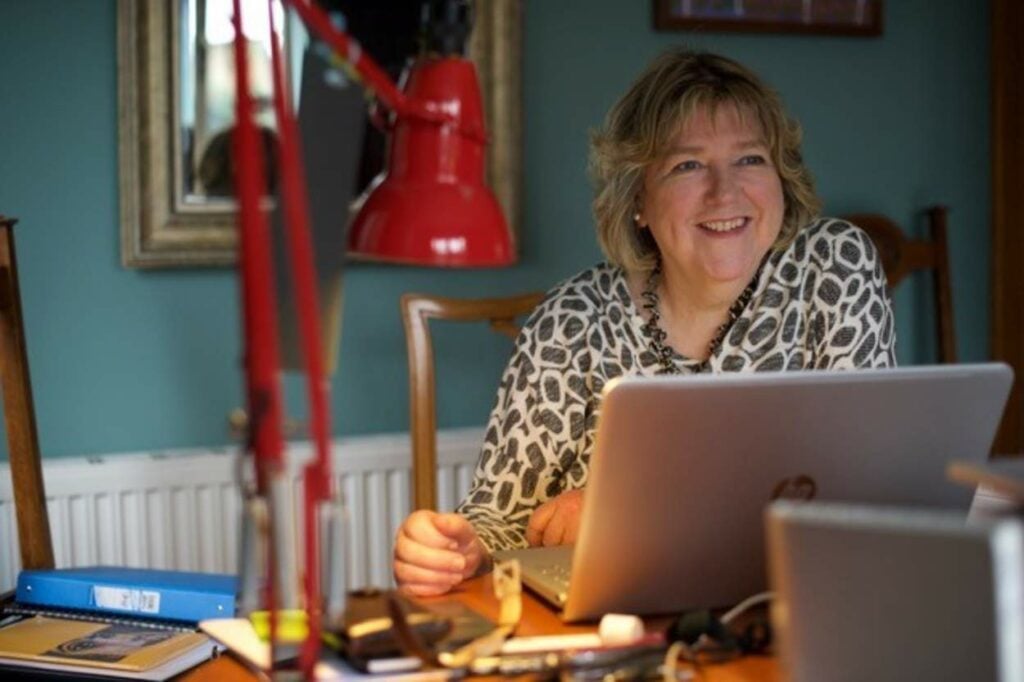The reality of dementia – the importance of evidence-based therapy and honest debate

We talked to Professor June Andrews about the public conversations that need to happen around dementia and why.

Listed in the Health Services Journal as one of the fifty most inspirational women in health care, Professor June Andrews directed the Dementia Services Development Centre at the University of Stirling for a decade. Also named one of the 100 most influential clinicians in England, Professor Andrews now consults independently on health and social care to improve the lives of people with dementia and their carers. We talked to her about the perception and reality of dementia – and the importance of an honest and robust public debate on issues such as the efficacy of therapies and funding.
How has the professional and public awareness of dementia changed – and why?
Dementia in old age has always been known. Affected older people were often described as “doted”, “senile” or “feeble-minded”. In the last century dementia as a symptom of illness was scarcely discussed. Even at the start of this one, most of the people who had dementia remained undiagnosed before they died.
Yet it was known for many years that dementia in the UK was costing the system more than cancer, heart disease and stroke put together. Most delayed discharges – so-called “blocked beds” – in hospitals involved older, female patients with cognitive impairment, but who did not need an acute hospital. The whole system was in trouble, and individual families were struggling.
When the pharmaceutical industry introduced medication that made some difference, it was initially expensive. So, its availability was carefully controlled on the NHS – this limit being exercised by restricting prescription to special clinics, staffed by psychiatrists of old age.
The waiting time for those clinics was long, and getting there depended on having an informed GP who would refer you. Because the medication worked best in the earlier stages of the illness, and indeed only works if the specific dementia is caused by Alzheimer’s disease, many people who might have benefited did not.
They weren’t referred and diagnosed at the right time, if at all. Alzheimer’s organisations, among others, raised awareness, the medication dropped in price, and the population continued to age – most people with dementia being old, or very old.
Governments created diagnostic guidelines and targets, and the public became more aware, so the picture looks quite different now. Still, there are GPs who think that there is not a lot you can do for dementia and that the pressure to diagnose is a sort of conspiracy between the Government and the pharmaceutical industry, which only wants to sell drugs to make money.
The cosy ordering of debate is about the fact that you don’t get far if you raise difficult questions: how much research is going into things we are already pretty sure won’t make a difference…how does “living well with dementia” reflect the reality for most people?
June Andrews
You have said, “we need to reframe the public perception of dementia in line with what we know to be true, rather than what we’d like to be true?
We, the public, would like it to be true that there is a cure around the corner, and that the NHS will care for us from the cradle to the grave, without cost at the point of delivery. We also want to believe that being kind to people with dementia is the answer to the problem.
In fact, despite almost weekly headlines on newspaper front pages, there is no prospect of a universal cure – because there are too many causes – and a cure for Alzheimer’s disease, the most prevalent cause of dementia, is still out of reach.
In respect of the NHS, geriatric beds have closed, and the health system expects families to organise arrangements, often at their own expense, for the care of the person with dementia in the last years of their lives outside of the hospital.
Only the poorest will receive financial aid, and care providers say that the state cash provided for poorer people does not even cover the cost of care. Care homes, for example, are often vilified for cashing in on the needs of older people and not giving proper care. In truth, with nearly half a million care home beds in the UK, it is incredible how much is done by them for so little.
We would also like to think that significant changes in dementia can be made by interventions that have not been rigorously evaluated, such as singing for the brain and so on.
A recent Cochrane review indicated that there is no research evidence to support the idea that this sort of thing makes a significant lasting difference to dementia. It is better and more humane than doing nothing, but it is often presented as more than that – actually being called “therapy” but not based on any rigorous, independent evidence.
How has dementia changed in the way it’s been framed in public discourse – and who sets the tone now, how and to what end?
Media is hugely influential. Only this week a UK newspaper with a circulation of over a million was criticised by Alzheimer’s Europe for a front-page headline that seemed to say that ibuprofen, an over-the-counter anti-inflammatory medicine, could cure Alzheimer’s. It is just the latest in a long line of stories that break the hearts of anxious families, desperate for a cure.
Celebrities share their stories in television programmes aimed at the general public. They have a considerable influence on what people think, although much of what they say is not based on evidence. Researcher and writer Philip Darbyshire often talks about the “Lacrimal Validity Score”: the more sentimental something is, the more it must be true.
Every charity that has a project locally or nationally is hungry to demonstrate to funders and other potential donors that the cash given has made a vast difference. This can lead to an overstatement of the effectiveness of interventions, and a reluctance [by others] to challenge people who are “at least doing something.”
The stories fill news outlets, charity websites, conversations at conferences and presentations. Funders are reassured, and potential donors are drawn to a narrative of hope. Economic evaluation is rare, as is a close study of how to scale up the findings. Much is made of little, often to get people to give more funding to an organisation, to sell papers or to further the careers of the commentators.
You have talked of the “cosy ordering of debate” around dementia – how important is a robust discussion in the public arena about the condition?
One has sympathy with politicians. They might want to avoid a discussion that tells the truth about a fundamental shift from societal funding to individual and family funding. They all saw what happened to Theresa May in the last election when she tripped over this one. Insurance companies won’t touch it with a barge pole.
There is a risk that the cost will increase – with longevity, costly increases in required standards for care homes set by unaccountable and risk-averse regulators and with increased wages for the lowest paid direct care staff. But calculating the level of financial risk is so difficult – there can be a feeling that it is best not to talk about it.
Follow Professor June Andrews on Twitter HERE.
In the light of this, I’d advise every person who can to go and talk to a financial adviser about what their own position is. Ask yourself, how will you pay for your own old age and frailty or that of your parents? And then come home and think about how much tax you are prepared to pay to make sure that people with no finances are cared for decently, and that their carers don’t have to sacrifice their health or career to fill the gap.
The cosy ordering of debate is about the fact that you don’t get very far if you raise difficult questions in this area. How much research is going into things that we are already pretty sure won’t make a difference? How realistic is the campaigning of the charities? How much government funding do they get, and does that influence the extent to which they challenge policy? How many well-funded projects are delivering things that only make a marginal difference to some of the least needy people affected? How does this trope about “living well with dementia” reflect the reality for most people?
When I publicly raised the issue of GPs who believe that someone has dementia but decide not to reveal the diagnosis because they think, “There’s no point”, I got hammered on social media and in medical newspapers by the doctors themselves. People who saw what happened to me decided to be quiet. There are things you are ‘not allowed to say’.
Is the Government doing enough to help those living with dementia, and if not what should it be doing?
The Government is doing a lot for people living with dementia, but not as much as those of us not living with dementia might imagine. That’s why you need to see a personal financial adviser.
I don’t know what I’d do if I were in Government, in the face of an electorate that will remove them if they tell the truth. And that truth is that in future people may be even more on their own than they are today – because the cost is so enormous and no one wants to share it. We don’t want to hear it.
![]() What do you think is the most powerful way to make a positive change for those living with dementia?
What do you think is the most powerful way to make a positive change for those living with dementia?
Make sure everything practitioners and charities are doing is based on evidence about what works, not just what is nice or a vanity project that makes your organisation look good – or what you have always done.
And tell every citizen that they are, if not entirely on their own, more on their own than they are expecting to be. Finally, look after yourself to delay or reduce the onset and severity of symptoms if it turns out you are one of the (relatively few) unlucky people.
This interview was part of a series brought to you by Elder, the company who provides live-in carers for the elderly. Whether you are looking for London live-in care or require assistance in another part of the country, Elder will ensure that all of your care needs are taken care of.
Further Information
Professor Andrews is a co-author of Ten Helpful Hints for Carers of People with Dementia and The One-Stop Guide to Dementia; Practical Advice for Families, Professionals, and People Living with Dementia and Alzheimer’s Disease.
Related Features
Dementia 2020 Citizen’s Panel: Making Britain the Best Place in the World for Dementia Care
Commissioned by the Department of Health the Dementia 2020 Citizen’s Panel gives people with dementia and their carers a chance to discuss the experience of living with dementia. We talked to Gareth James from the Dementia and Disabilities Unit about the aims for and importance of this wide-ranging initiative.
Dementia Across Borders: Alzheimer’s Disease International on the Global Approach to Dementia
Paola Barbarino, CEO of Alzheimer’s Disease International, on the organisation’s goal of making dementia a global health priority, cultivating understanding, both locally and globally, and working to reduce the stigma associated with the condition.
Inequalities in Later Life: Dr Laurie Corna, Lecturer in Gerontology, King’s College London
We talked to Dr Laurie Corna, Lecturer in the field of Ageing at King’s College London about the positive implications of gerontological education and the power of an interdisciplinary approach to the issues of later life.
Learning Disabilities and Dementia: Providing Effective Care for Those with More Complex Needs
Research indicates that people with a learning disability are more likely to develop dementia, and earlier. For MacIntyre’s Emma Killick, it’s vital that boundaries are broken down between specialist healthcare organisations and charities in order to respond to a complex set of needs.
Dementia Across Cultures and Ethnicities: An Interview with Author, Dr Julia Botsford
We talked to Dr Julia Botsford about the questions and issues that cultural and ethnic differences can raise in the provision of support and the creation of services for those living with dementia and their families.
Read our latest interviews
Browse our latest interviews, and research on elderly living, from leading national experts.

How ageist is our society? – Interview with the Centre for Ageing Better
Ahead of their Action Day on the 20th March, we spoke to the Centre for Ageing Better about their pioneering ‘Age Without Limits’ campaign which is encouraging everyone to take a stand against ageism.

More than just a pet – Interview with Give a Dog a Bone Founder Louise Russell
Give a Dog a Bone founder Louise Russell discusses her mission to provide companionship for elderly individuals through the love and comfort of pets. Learn more about her inspiring work to improve the lives of older people.

Neurodiversity and ageing – What do we know?
In this guest think piece Professor Amanda Kirby discusses how far we’ve come in understanding neurodiversity in later life, and how far we still have to go.

Struggling to talk about care? Elder’s latest survey finds you’re not alone.
Back to News page > Quick overview A recent survey from Elder – a leading live-in care marketplace, found just 27 percent of older people

How can caregivers overcome sleep problems?
We asked Channel 4 sleep expert Stephanie Romiszewski about the impact of poor sleep, and how caregivers can break unhealthy sleep cycles.

The therapeutic power of gardening: Advice from Thrive
We recently asked Thrive – a national charity that uses gardening to improve wellbeing – about the therapeutic power of gardening.